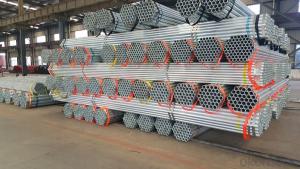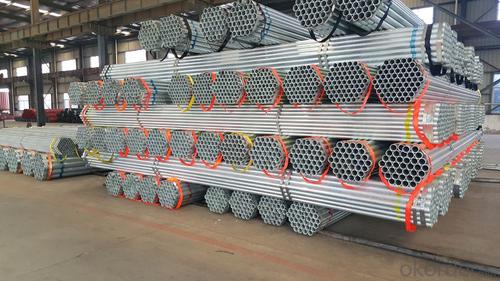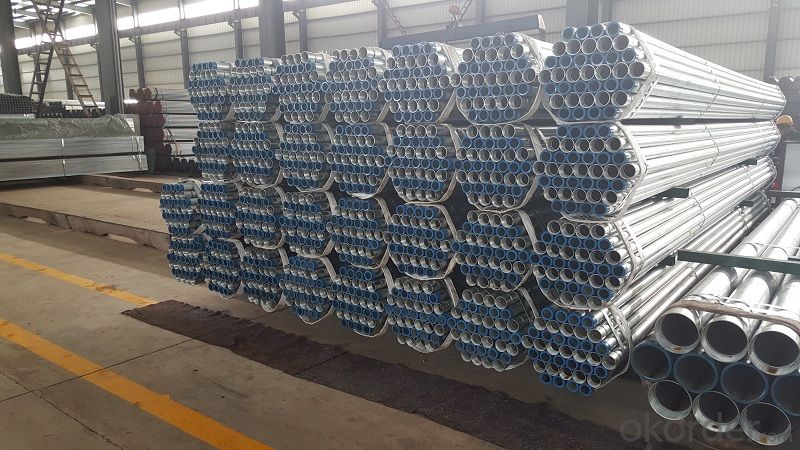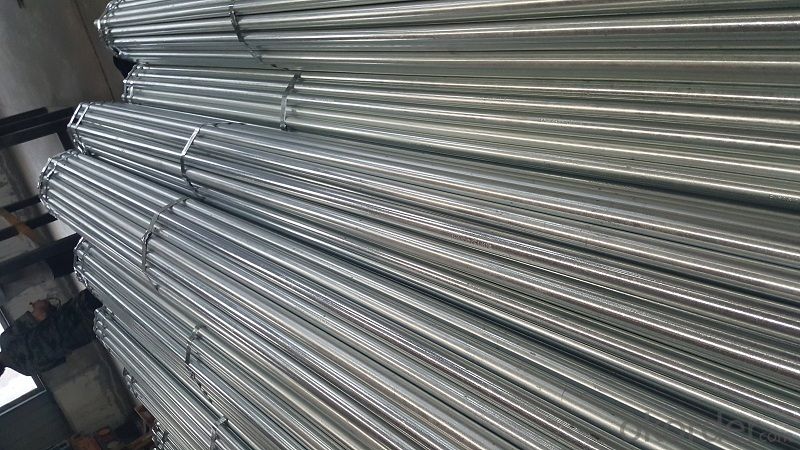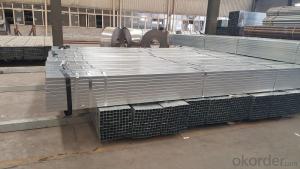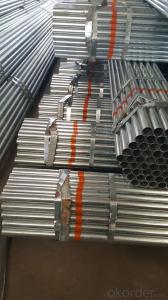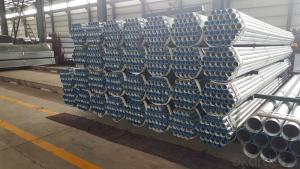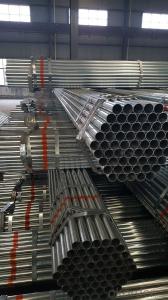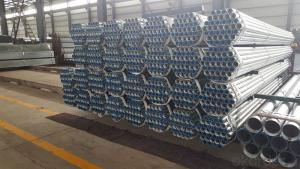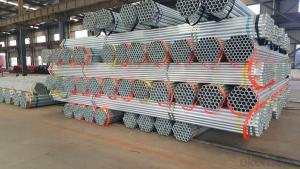Galvanized welded steel tubes for mechanical equipment
- Loading Port:
- Tianjin
- Payment Terms:
- TT OR LC
- Min Order Qty:
- 15 m.t.
- Supply Capability:
- 15000 m.t./month
OKorder Service Pledge
OKorder Financial Service
You Might Also Like
Specification
1、Structure of Galvanized welded steel pipe for materials :
The surface of galvanized steel pipe welded steel pipe of hot dip galvanized layer or. Galvanized can increase the corrosion resistance of the steel tube, prolong service life. Galvanized pipe is widely used, in addition to water, gas, oil and other general low pressure fluid pipelines. It is also used in the petroleum industry, especially for offshore oil field of oil well pipe and oil pipe, chemical, coking equipment of oil heater, condensation cooler, coal run oil exchanger tube, and trestle pile, the mine tunnel support frame tube.
2、Main Features of Galvanized welded steel pipe for building materials :
• High manufacturing accuracy
• High strength
• Good visual effect
• Reasonable price
3、 Galvanized welded steel pipe for building materials Specification:
Standard | GB, DIN, ASTM ASTM A106-2006, ASTM A53-2007 |
Grade | 10#-45#, 16Mn 10#, 20#, 45#, 16Mn |
Thickness | 1 - 33 mm |
Section Shape | Round |
Outer Diameter | 21 - 610mm |
Place of Origin | Tianjin, China (Mainland) |
Secondary Or Not | Non-secondary |
Application | Hydraulic Pipe |
Technique | Cold Drawn |
Certification | API |
Surface Treatment | factory state or painted black |
Special Pipe | API Pipe |
Alloy Or Not | Non-alloy |
Length | 5-12M |
Outer Diameter | 21.3-610mm |
Grade | 20#, 45#, Q345, API J55, API K55, API L80, API N80, API P110, A53B |
Standard | ASME, ASTM |
1) Material:Q195 Q235 Q345 X42 X52
2) Specification range:OD:21.3-610mm,WT:6-70mm,length:6-12m or according to the requirement of clients.
3) Excutive standards:GB,ASME API5L.ASTM A 106/A53,Despite of the above standards,we can also supply seamless steel pipe with standard of DIN,JIS,and so on,and also develop new products according to the requirements
4、Packaging & Delivery
Packaging Details: | seaworthy package,bundles wrapped with strong steel strip |
Delivery Detail: | 15-30days after received 30%TT |
5、FAQ of Galvanized welded steel pipe for building materials :
①How is the quality of your products?
Our products are manufactured strictly according to national and internaional standard, and we take a test
on every pipe before delivered out. If you want see our quality certifications and all kinds of testing report, please just ask us for it.
Guaranteed: If products’ quality don’t accord to discription as we give or the promise before you place order, we promise 100% refund.
②How about price?
Yes, we are factory and be able to give you lowest price below market one, and we have a policy that “ for saving time and absolutely honest business attitude, we quote as lowest as possible for any customer, and discount can be given according to quantity”,if you like bargain and factory price is not low enough as you think, just don’t waste your time.Please trust the quotation we would give you, it is professional one.
6、 Galvanized welded steel pipe for building materials Images:
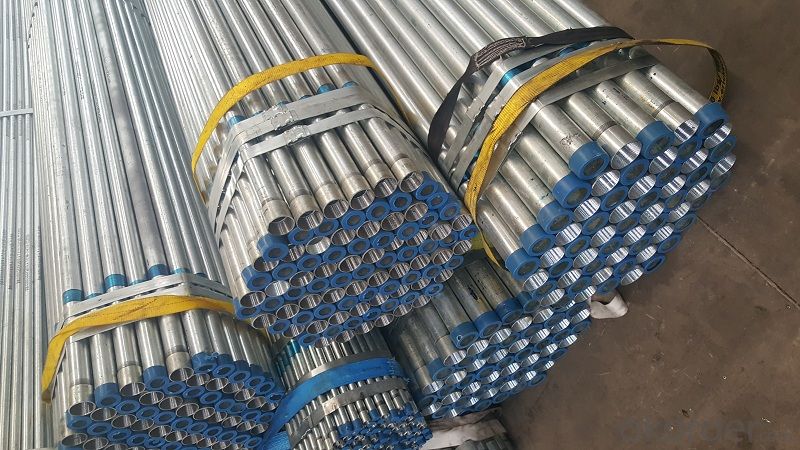
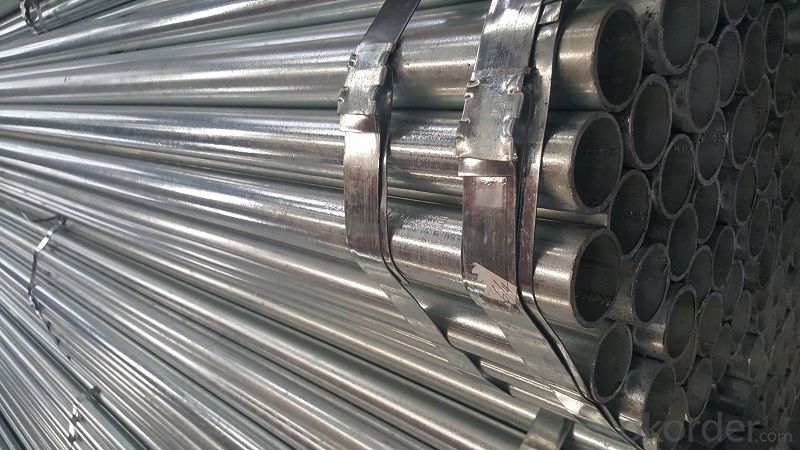
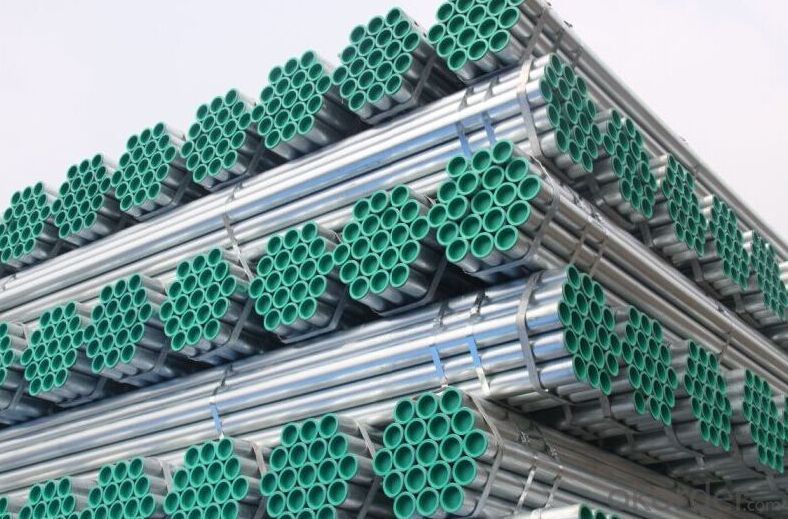
- Q: What are the different methods of pipe cutting for steel pipes?
- There are several methods of cutting steel pipes including manual methods such as hacksaw cutting and abrasive cutting, as well as more advanced methods like plasma cutting, laser cutting, and water jet cutting. Each method has its own advantages and is selected based on the specific requirements of the project.
- Q: How do steel pipes withstand pressure?
- Steel pipes withstand pressure due to their inherent strength and resilience. The high tensile strength and durability of steel allow it to withstand the internal pressure exerted by fluids or gases flowing through the pipes. Additionally, the thick walls and cylindrical shape of the steel pipes distribute the pressure evenly, preventing any deformation or rupture. The seamless construction of steel pipes further enhances their ability to withstand pressure, making them a reliable choice for various applications in industries such as oil and gas, plumbing, and construction.
- Q: Can steel pipes be used for conveying steam?
- Indeed, steam can be conveyed using steel pipes. Steel pipes find frequent application in steam distribution systems owing to their impressive strength and long-lasting nature. They possess the ability to endure high temperatures and pressures associated with steam transportation without succumbing to deformation or leakage. Furthermore, steel pipes exhibit remarkable heat resistance properties, rendering them suitable for conveying steam at elevated temperatures. Nevertheless, it is crucial to guarantee adequate insulation of the steel pipes in order to avert heat loss and uphold the desired steam temperature throughout the transportation process.
- Q: What are the different types of steel pipe connections?
- There are several types of steel pipe connections, including threaded connections, welded connections, flanged connections, and grooved connections.
- Q: How are steel pipes protected against external impact or mechanical damage?
- Steel pipes are typically protected against external impact or mechanical damage through the use of various methods such as applying protective coatings, installing corrosion-resistant materials, using concrete encasement, or utilizing protective shields or guards.
- Q: Can steel pipes be used for underground culverts?
- Indeed, underground culverts can utilize steel pipes. Renowned for their robustness, longevity, and ability to withstand diverse environmental influences, steel pipes are ideal for subterranean applications. They exhibit exceptional resilience to substantial burdens, intense hydrostatic pressure, and the erosive impact of soil and water. Moreover, steel pipes offer a range of dimensions and thicknesses, enabling customization to meet precise project prerequisites. Nevertheless, prudent consideration must be given to variables such as soil attributes, water table elevations, and the likelihood of corrosion during the selection of the most fitting steel variant and protective coatings for the pipes.
- Q: How are steel pipes recycled?
- Steel pipes are recycled through a multi-step process that involves collection, sorting, cleaning, and melting. First, the used steel pipes are gathered from various sources such as construction sites or industrial facilities. Then, they are sorted based on their size, shape, and quality. Next, any contaminants or coatings are removed from the pipes through cleaning and stripping processes. Finally, the cleaned pipes are melted down in a furnace, and the molten steel is formed into new pipes or other steel products. This recycling process reduces the demand for new raw materials and helps conserve energy and resources.
- Q: What are the different sizes of threads available for steel pipes?
- The different sizes of threads available for steel pipes vary depending on the specific requirements and standards. Common thread sizes for steel pipes include 1/8", 1/4", 3/8", 1/2", 3/4", 1", 1-1/4", 1-1/2", 2", 2-1/2", 3", 3-1/2", 4", 5", 6", 8", 10", and 12". However, these sizes may vary based on the specific industry, country, and application.
- Q: What are the different methods of pipe joining for steel pipes?
- The different methods of pipe joining for steel pipes include welding, threaded connections, flanged connections, and grooved connections. Welding involves melting the two ends of the pipes together to form a strong bond. Threaded connections involve screwing the pipes together using thread tape or sealants to create a tight seal. Flanged connections use flanges and bolts to join the pipes together, providing a secure and leak-proof connection. Grooved connections involve using grooved couplings and gaskets to connect the pipes, allowing for quick and easy installation.
- Q: How are steel pipes used in the manufacturing of machinery and equipment?
- The manufacturing of machinery and equipment heavily relies on the widespread utilization of steel pipes, thanks to their numerous advantageous properties. These pipes serve as a primary means of conveying different materials, fluids, and gases within the machinery, effectively ensuring safe and efficient transportation. One crucial application of steel pipes in machinery manufacturing lies in the realm of hydraulic and pneumatic systems. Hydraulic systems depend on steel pipes to transmit power and regulate fluid flow, while pneumatic systems utilize these pipes to transport compressed air, powering various components. The strength and durability inherent in steel pipes guarantee their ability to withstand the immense pressure and forces exerted by these systems, making them a dependable choice for such purposes. Moreover, steel pipes find extensive use in the construction of machinery frames and structures. Their exceptional tensile strength and resistance to corrosion make them an ideal option for providing structural support and stability to heavy machinery. These pipes can be effortlessly welded, bent, and fabricated into diverse shapes, allowing for flexibility in design and enabling the creation of intricate machinery structures. Furthermore, steel pipes play an indispensable role in the transportation of raw materials and finished products throughout the manufacturing process. They frequently serve as conduits for the movement of liquids, gases, and granular materials, ensuring the smooth operation of machinery and equipment. Steel pipes are particularly well-suited for handling abrasive and corrosive materials, as their robust construction guarantees minimal wear and tear over time. In conclusion, the extensive utilization of steel pipes in the manufacturing of machinery and equipment stems from their strength, durability, and versatility. Whether it be for hydraulic systems, structural support, or material transportation, steel pipes form an integral component that significantly contributes to the efficiency and dependability of machinery across various industries.
Send your message to us
Galvanized welded steel tubes for mechanical equipment
- Loading Port:
- Tianjin
- Payment Terms:
- TT OR LC
- Min Order Qty:
- 15 m.t.
- Supply Capability:
- 15000 m.t./month
OKorder Service Pledge
OKorder Financial Service
Similar products
Hot products
Hot Searches
Related keywords
